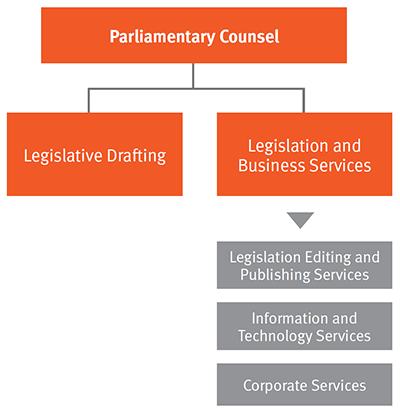Office of the Queensland Parliamentary Counsel
The Office of the Queensland Parliamentary Counsel (OQPC) supports democracy and delivers on the government’s objectives for the community by providing legislative drafting services to all Queensland public sector agencies and access to legislation on the Queensland legislation website (www.legislation.qld.gov.au).
OQPC was established as a statutory authority under the Legislative Standards Act 1992 on 1 June 1992. Subject to the Minister, the Premier of Queensland, OQPC is controlled by the Queensland Parliamentary Counsel.
Key achievements for 2016–17
- Delivered the government’s legislative program within required timeframes.
- Drafted national scheme legislation on behalf of the Australasian Parliamentary Counsel’s Committee.
- Publicly launched a preview version of the new Queensland legislation website.
- Hosted the 2016 Parliamentary Counsel’s Committee Australasian Business, Publishing and Information Technology Forum with delegates from all Australian offices of parliamentary counsel, New Zealand, Hong Kong and Singapore.
- Supported the YMCA 2017 Queensland Youth Parliament, including providing assistance with the formatting and supply of eight Youth Bills.
Our performance
The following service standards in DPC’s Service Delivery Statement were used to assess OQPC’s overall performance.
| Legislative drafting and e-publishing |
Notes |
2016–17
target/estimate |
2016–17
actual |
| Service standards |
Effectiveness measure
Percentage of client satisfaction with legislative drafting services provided by the Office of the Queensland Parliamentary Counsel |
1 |
85% |
97% |
Efficiency measure
Percentage of client satisfaction with the quality of access to legislation available online |
1 |
85% |
97% |
Notes:
- This service standard informs on overall satisfaction levels with the quality, timeliness and support provided by Legislative drafting and e-Publishing and is derived from an annual client survey. Customers are ministers, chiefs of staff, directors‑general and their department’s cabinet legislation and liaison officers and senior policy officers.
In addition to the annual departmental client survey, OQPC seeks feedback from instructing agencies on performance in relation to individual drafting projects. Four standard questions are asked and an opportunity is provided for general commentary:
| 2016–17 survey questions |
Results* |
| How would you rate the quality of the drafting product? |
98% |
| How would you rate the level of service in providing advice on alternative ways of achieving policy outcomes? |
98% |
| How would you rate the level of service in providing advice on the application of Fundamental Legislative Principles? |
98% |
| How would you rate the level of service provided by the drafter during the drafting project? |
100% |
| Average of all four questions |
98% |
* Percentage of positive responses received.
Future directions for 2017–18
- Continue to provide high quality and timely drafting services to support delivery of the government’s legislative program and the Parliament.
- Continue to provide accurate and timely access to legislation to the community on the Queensland legislation website.
- Complete full transition to the new Queensland legislation website, including support for the Queensland Government’s open data initiative.
- Implement a range of knowledge management and sharing initiatives including redevelopment of OQPC’s intranet.
At a glance, in 2016–17:
- 484 legislative instruments drafted
- 27,371 total pages drafted
- 53 government Bills drafted
- 13 private members’ Bills drafted
- 38 amendments during consideration in detail for government Bills, totalling 189 pages
- 23 amendments during consideration in detail for private members’ Bills, totalling 98 pages
- 316 items of subordinate legislation drafted
- 815 reprints of legislation
- 179,788 total pages reprinted
- 102 total other legislative publications
- 6666 total pages of other legislative publications
- 4,695,696 total legislation web hits
Case study
Serious and Organised Crime Legislation Amendment Bill 2016
The Serious and Organised Crime Legislation Amendment Bill 2016 was introduced into the Legislative Assembly on 13 September 2016.
The Bill honoured the government’s election commitment in relation to dealing with organised crime and created a new organised crime regime drawing on the recommendations of three reviews commissioned by the government:
- the Queensland Organised Crime Commission of Inquiry
- the Taskforce on Organised Crime Legislation
- the statutory review of the Criminal Organisation Act 2009.
The new regime delivers a comprehensive approach to addressing serious and organised crime across all stages of the criminal justice system with key elements including:
- a new consorting offence
- public safety protection orders consisting of public safety orders, restricted premises orders and fortification removal orders
- extension of the banning of ‘colours’ to all public places, not just licensed venues
- new offences and increased penalties for child exploitation material offences, sophisticated financial crimes and drug trafficking
- improved powers for police to utilise the new organised crime regime and to investigate and gather evidence of crimes associated with child exploitation and financial crimes.
The drafting of the Bill involved significant collaboration between the Office of the Queensland Parliamentary Counsel, the Department of Justice and Attorney-General, the Queensland Police Service, Crown Law and the Department of the Premier and Cabinet.
Organisational structure
The office is located at 111 George Street, Brisbane and all staff work from that location. The current structure is summarised in the organisational chart:
